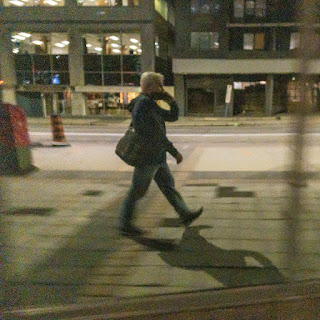from Report from the Reid Society, Vol. 1, No. 1
1/
Skip the biography: remember the voice,
visceral words
packaged by the mouth
(like bubble-wrapped ceramic cups from a Gatineau artisan)
dispatched on the air, measured, weighed,
said, as they must have been written,
with cadence and the musical clarity
of a well-tuned mandolin.
2/
The poems of Monty Reid I most admire may not have seen print. I recall sitting in the basement of the Royal Oak on a Tuesday evening more than ten years ago. Monty was probably the featured reader at the Tree Reading Series—I can’t recall the details. At the time, Monty had published The Luskville Reductions, poems about the end of a marriage and the inevitable role of place in our recollections of such dissolutions. It’s a book I would like to return to these days for wisdom, comfort, insight, and verbal music. Unfortunately, too many of my books are in storage after the failure of a marriage.
Quoted in a review by one of this peers and mentors, Doug Barbour, Monty writes,
The rain is finished
but there is always something
in the lid of the body
that resists
and something with bigger holes in it
than the holes in rain.
The body. It’s something many of us have difficulty writing about beyond abstractions, vindications, and naïve celebrations.
3/
I was sitting in a chair at the Royal Oak listening to Monty Reid read new poems about the partners in our life: the parasites in our bodies we sometimes depend on, sometimes suffer from, the microscopic creatures that call our bodies home. I recall a line about a midnight itch being, perhaps, the head of a pinworm. I recall—or imagine—more benign arthropods feeding on dead epithelial cells. It struck me that these poems were beyond the merely subversive: they were matter-of-fact but deeply unsettling for me—in the best possible way. Imagine something so visceral delivered in disarmingly simple language. There was neither revulsion nor wonder: I heard the cadences of the earthly reality of one of the planet’s most complex ecosystems: the human body over which we have far less mastery than we would like. We are inhabited by the unseen. Our lives depend on it.
4/
Monty Reid gardens naked.
The ghost of William Blake stands, arms crossed,
naked on a heap of mushroom compost.
Monty plants a seedling tomato.
William contemplates an eternal truth,
imagines his burin engraving it.
Monty mumbles the truth about the soil
lining his hands and feet.
William eats a ghost tomato without pleasure.
5/
Monty Reid appears to have unlearned the cultural shame and embarrassment of the body many of us have inherited from the western Christian tradition. It could be he never really learned it. He writes with ruthless clarity about the body’s wonders, joys, depredations. In Meditatio Placentae—a book it’s difficult for me to quote from because it’s in a box in storage (I found an e-book version)—Monty writes,
The body always retains something that it gives up,
a trace of what’s gone. But of course the body has also been given up
by something with different audio. I came out with a kind of plop
and then there was another but less emphatic plop when they
dropped me in the yoghurt tub, so the angels can carry me back home.
Here even the most sacred elements of the body are bifurcated. At birth, the body and the body’s partner container have irreconcilable dispositions: loving arms, a container for fermented milk. Is there a stark truth of existence more fundamental?
6/
I would never garden naked
the shears less terrifying
than the embarrassment
of being
seen.
7/
Which number is larger: the number of poems published by Monty Reid or the number of poets Monty Reid has cultivated via the journal Arc or as the artistic director of Verse Fest? I don’t know.
Which number is larger: the number of human cells in a human body, or the number of microbial cells in the human body? I’m uncertain.
These numbers may unknowable. The proportions may be unknowable. The latest research on the human microbiome suggests we host more non-human cells than our own. Monty Reid is one of those writers whose impact is complex: in its deceptive simplicity and musical cadences, Monty’s poetry activates certain pathways that enable new kinds of poetry in fellow poets; in his tireless exploration and cultivation of the work of poets on a global scale, Monty has created opportunities for countless poets to be heard, seen, and enter into conversation.
So Monty’s work—the poems and the life of poetry—is a garden, one full of the teaming life of material, living things, and a sense of wonder at the diversity the planet puts before us if we attend to it.
8/
Swaths of our life are unseen.
We sleep.
We work sometimes alone, see
our hands, belly, knees, feet.
We have a lover once in a lifetime
that sees us—sees
us. We appear to be
never more than
partially grasped, stood upon.
A mirror is the flat
window for our
awakening and soon-to-be
sleeping selves
cut off at the belt or the knees.
Seldom
full-bodied.
Those other moments,
the vast
hours of breath,
unremarked
by the living being
sustaining
its squirming,
invisible trillions.
Stephen Brockwell grew up in Montreal and will likely shrink down in Ottawa. He helps run one of Canada’s oldest poetry reading series, Tree, with Brandon Wint and Avonlea Fotheringham. Immune to the Sacred is scheduled for publication in 2022. He hosts more parasites than open mics.


